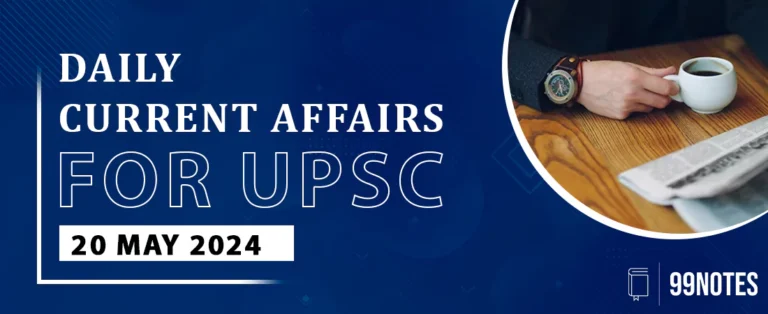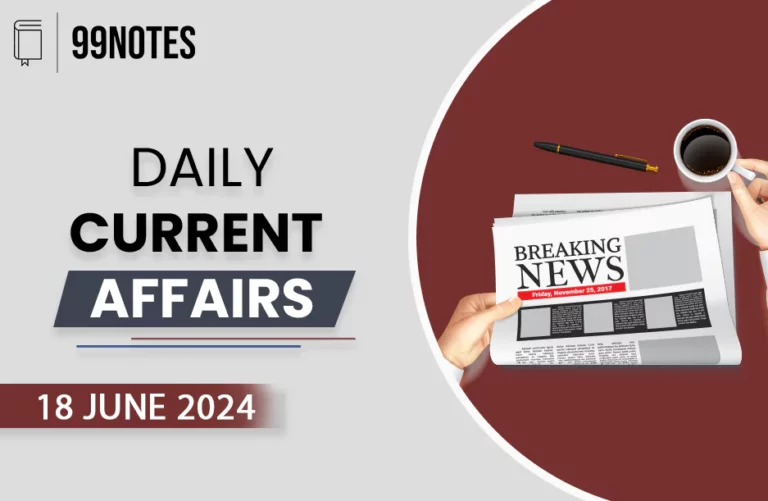18 Jan 2024 : Daily Current Affairs
Daily Current Affairs
18-January-2024
1. ASER 2023 Report Reveals Alarming Skill Deficit Among Rural Indian Adolescents: Urgent Need for Foundational Learning to Ensure Economic Growth
| Topic: GS2 – Social Justice – Education This topic is relevant for both Prelims and Mains in the context of educational challenges faced by adolescents in rural India. |
| Context: |
|
Reading and Language Skills:
- The report shows that a sizable percentage of teenagers (26.5%) are still unable to read a textbook for class 2 in their native tongue, even after they have completed Class 10 and higher secondary education.
- Furthermore, of those who can read English sentences, almost a quarter (26.5%) are unable to understand the sense of the text.
- Of those who can read, 7% find it difficult.
Mathematics Proficiency:
- A basic 3-digit by 1-digit division issue is extremely difficult for 56.7% of pupils assessed, indicating that basic mathematics is a substantial challenge.
- This division deficit is thought to be a sign of a more general difficulty with fundamental mathematical operations.
Application of Skills to Everyday Tasks
- The ASER 2023 report assesses teenagers’ aptitude for using fundamental reading and maths skills in real-world situations.
- Remarkably, 45% or less of respondents can figure out how many hours a youngster slept by just their bedtime and wake-up times.
- Deficits are also revealed by routine tasks like measuring an object with a ruler, where only 40% of respondents give accurate responses when the object is moved on the ruler.
Gender Disparities
- When it comes to basic reading and numeracy activities, boys perform better than girls every time.
- For instance, just 41.8% of girls are proficient in division, compared to 45% of boys.
- There are comparable differences in time calculation abilities.
School Enrollment Rates:
- The report highlights that 86.8% of children between the ages of 14 and 18 are enrolled in school, despite concerns raised during the pandemic.
- This suggests that longer schooling does not always translate into better basic skills.
Importance of Foundational Learning:
- Experts highlights the importance of life skills and fundamental education and stresses that for India to meet its developmental goals, the labour force’s calibre must match those needs in order for the nation to realise its economic potential.
Stream Preferences and Technology Usage:
- According to the survey, the Arts/Humanities stream is chosen by 55.7% of young people in this age bracket, with STEM (31.7%) and Commerce (9.4%) coming in second and third, respectively.
- Furthermore, there is a clear acceptance of technology, as evidenced by the 89% of households using smartphones and the 92% who report being proficient users.
Conclusion:
- The ASER 2023 report reveals a worrisome skill gap among adolescents in rural India, highlighting the critical need for improved foundational learning to get them ready for both academic and real-world difficulties.
- India must eliminate these educational gaps if it hopes to take advantage of its demographic dividend and spur economic expansion.
| PYQ: Discuss the main objectives of Population Education and point out the measures to achieve them in India in detail. (250 words/15m) (UPSC CSE (M) GS-1 2021) |
| Practice Question: Despite high enrollment rates, the ASER 2023 report underscores a concerning skill deficit among rural Indian adolescents. Discuss the implications of these findings on India’s socio-economic landscape and propose policy measures to address the identified educational challenges. (250 words/15 m) |
2. Wheat Stocks Plummet to Seven-Year Low in Government Godowns, Posing Challenges Amidst Inflation Concerns and Electoral Pressures
| Topic: GS3 – Agriculture – Food security This topic is not much relevant in the context of Prelims but more for Mains in the context of complexities of managing food stocks, the impact on inflation, and the role of governance in addressing these challenges. |
| Context: |
|
Current Stocks and Buffer Levels:
- The depletion is noticeable even though the present wheat stocks are greater than the 138 lt minimum buffer needed for three months’ worth of operational demands (including a 30 lt strategic reserve).
- When combined with the 516.5 lt of rice supplies, the 680 lt total stores are considerably greater than the 214.1 lt required for this time.
Inflation and Government Measures:
- The government has taken action to curb cereal inflation in spite of the fall in wheat stocks.
- These actions include restricting the amount of wheat that wholesalers and retailers can retain, banning the export of wheat and non-basmati rice, and selling grain from FCI’s stocks on the open market.
- In December, retail cereal prices increased 9.93% year over year, following 15 months of double-digit inflation.
Challenges and Concerns:
- Concerns are raised by the declining wheat stocks, especially in light of the approaching Lok Sabha elections in April and May.
- The amount of the incoming wheat crop, which is anticipated to be harvested by the end of March, will determine how effective inflation control efforts are.
- The present seeded area, at 336.96 lakh hectares, is encouraging, but there is a concern because the wheat crop is susceptible to temperature increases, as demonstrated by the 2021–2022 season.
Crop Outlook and Potential Challenges:
- This year, farmers have planted more wheat, and as the crop nears the heading stage, the conditions seem to be favourable.
- March is a crucial month for grain formation and filling, but the crop is still vulnerable to temperature changes.
- Unfavourable weather, akin to what has happened in the past, can make problems caused by low stockpiles and nearly double-digit inflation in cereal prices worse, possibly requiring imports.
| PYQ: What are the major factors responsible for making rice-wheat system a success? In spite of this success how has this system become bane in India? (UPSC CSE (M) GS-3 2020) (250 words/15m) |
| Practice Question: Discuss the role of agricultural policies and governance in ensuring food security and sustainable management of cereal stocks in the country. (150 words/10 m) |
3. Government Disburses Rs 4,415 Crore Under PLI Schemes Across Eight Sectors, Addresses Job Creation Concerns
| Topic: GS2 – Governance – Government policies – Interventions for development in various sectors This topic is relevant for both Prelims and Mains in the context of economic policies, their implications, and the broader impact on job creation and industrial development |
| Context: |
|
PLI Schemes Overview:
- In 2021, the government launched PLI programmes for 14 sectors, with a budget of Rs 1.97 lakh crore.
- The programmes’ objectives are to draw capital into important industries, advance cutting-edge technology, guarantee effectiveness, bring economies of scale and size to the production process, and raise the standing of Indian businesses abroad.
Job Creation Concerns and Government Response:
- Department for Promotion of Industry and Internal Trade (DPIIT), acknowledged the tech-driven nature of these industries but emphasised that they have lesser employment creation amid worries over poor job creation linked with the PLI initiatives.
- In response to criticism voiced by former RBI governor Raghuram Rajan, the department stated that around 6.78 lakh jobs—both direct and indirect—have been created.
Investment and Production Outcomes:
- As of November 2023, reported investments exceeding Rs 1.03 lakh crore translated into Rs 8.61 lakh crore in production and sales.
- The programmes have drawn more than 1,000 units, and exports above Rs 3.2 lakh crore have been recorded, with notable contributions from the telecom, electronics, pharmaceutical, and food processing industries.
Future Targets and DPIIT Initiatives:
- By the end of the fiscal year, Rs 11,000 crore is the targeted disbursement amount.
- Departments convey confidence in reaching or nearly reaching this goal. A framework has been put in place by the DPIIT to help PLI recipient enterprises apply for visas.
- There has been a notable surge in foreign direct investment, and the telecom industry has accomplished 60% import substitution.
Conclusion:
- The government’s commitment to promoting economic growth and competitiveness is demonstrated by the Rs 4,415 crore it has disbursed under the PLI schemes across multiple sectors.
| PYQ: Consider, the following statements: (2023) Statement-I: India accounts for 3.2% of global export of goods. Statement-II: Many local companies and some foreign companies operating in India have taken advantage of India’s ‘Production-linked Incentive’ scheme. Which one of the following is correct in respect of the above statements?
Ans: (4) |
| Practice Question: Evaluate the effectiveness of PLI initiatives in attracting investments and fostering competitiveness in key sectors. (150 words/10 m) |
4. Disproportionate act: Centre for Policy Research on cancellation of FCRA licence.
| Topic: GS2 – Governance – Development processes and the development industry – NGOs UPSC candidates should understand the implications of CPR’s FCRA cancellation, involving foreign fund diversion for protests, impacting developmental projects and research institutions. |
| Context: |
|
More information on this news:
- The Centre for Policy Research (CPR) faced accusations of diverting foreign donations to fund protests and legal battles against developmental projects.
- The Union Home Ministry canceled CPR’s FCRA registration on January 10, rendering it ineligible for foreign donations.
- CPR accused of violating foreign fund norms by engaging in the production of current affairs programs using foreign funds.
- Government cites FCRA Section 3, prohibiting acceptance of foreign funds for current affairs programs by various entities, including research institutions.
- CPR contends the Ministry’s decision is incomprehensible and disproportionate, challenging the very basis of its research institution functioning.
- Source claims CPR’s FCRA registration was canceled for multiple violations, including using foreign funds for litigation activities against coal mines/plants.
- The Congress criticizes the government’s move, characterizing it as an attempt to target CPR for its integrity and principled stance.
| More about The Foreign Contribution (Regulation) Act (FCRA) |
|
| PYQ: Examine critically the recent changes in the rules governing foreign funding of NGOs under the Foreign contribution (regulation) Act (FCRA), 1976. (UPSC CSE (M) GS-2 2015) (200 words/12.5 m) |
| Practice Question: Examine the role of FCRA in safeguarding national interests and governance in India. Discuss key provisions and challenges. (150 words/10 m) |
5. CERT-IN takes over 11 months to plug vulnerabilities exposing personal data.
| Topic: GS3 – Internal Security – Challenges to internal security through communication networks – Basics of Cyber Security UPSC Perspective: Reveals lapses in cybersecurity, potential data theft risks, underscores the need for robust digital governance and regulatory oversight. |
| Context: |
|
Additional information on this news:
- Sai Krishna Kothapalli, CEO of Hackrew Infosec, discovered a critical vulnerability exposing personal details of top Indian industrialists, celebrities, and sports personalities.
- The vulnerability was found in a government portal managed by the Corporate Affairs Ministry.
- Personal information such as Aadhaar, PAN, voter ID, passport details, date of birth, contact numbers, and addresses of around 98 lakh directors of Indian companies was at risk.
- Kothapalli reported the issue to CERT-IN on January 16, 2023, but it took 11 months and four days to be resolved.
- Despite assurances from CERT-IN, the vulnerability persisted, leading to concerns about potential theft or misuse of sensitive data.
- Kothapalli has called for a thorough investigation into the matter.
- The issue highlights the significance of timely cybersecurity measures in protecting personal information from unauthorized access and potential exploitation.
| More About CERT-IN |
|
| PYQ: Data security has assumed significant importance in the digitized world due to rising cyber crimes. The Justice B. N. Srikrishna Committee Report addresses issues related to data security. What, in your view, are the strengths and weakness of the Report relating to protection of personal data in cyber space? (250 words/15m) (UPSC CSE (M) GS-3 2018) |
6. Over half of youth struggling with basic maths: ASER study
| Topic: GS2 – Social Justice – Education UPSC aspirants must grasp ASER findings as it addresses vital education challenges in rural India, crucial for policy understanding. |
| Context: |
|
- Survey Details: The Annual Status of Education Report (ASER) titled “Beyond Basics” conducted by Pratham focused on rural students aged 14 to 18.
- Geographic Scope: The survey covered 28 districts across 26 States in India.
- Participants: The assessment included 34,745 students, evaluating their foundational reading, arithmetic abilities, digital awareness, and skills.
- Enrollment Rates: Overall, 86.8% of 14 to 18-year-olds are enrolled in educational institutions, with notable variations by age. The percentage of non-enrollment is 3.9% for 14-year-olds and 32.6% for 18-year-olds.
- Stream Distribution: In Class 11 or higher, a majority (55.7%) of students are enrolled in the Arts/Humanities stream. Girls are less likely to enroll in the Science, Technology, Engineering, and Mathematics (STEM) stream (28.1%) compared to boys (36.3%).
- Basic Abilities: About 25% of students cannot fluently read a Class 2 level text in their regional language. Over half struggle with division (3-digit by 1-digit) problems, with only 43.3% able to solve them correctly.
- English Proficiency: Approximately 57.3% of students can read sentences in English, and of those, almost three-quarters (73.5%) can comprehend their meanings.
- Digital Literacy: Close to 90% of all surveyed youth have a smartphone in their households and possess the skills to use it.
- Challenges: The report highlights challenges in basic reading, math skills, and English proficiency among surveyed students, emphasizing the need for educational improvements.
7. Where do China-Taiwan relations stand?
| Topic: GS2– International Relations Significant for UPSC as it highlights Taiwan’s democratic choice, China’s diplomatic influence, and the evolving geopolitical dynamics in the region. |
| Context: |
|
More information on this news:
- Taiwan Election Outcome: Lai Ching-te of the Democratic Progressive Party (DPP) wins the presidential election, marking a third term for the DPP in Taiwan.
- China’s Reaction: China perceives the DPP, seen as a pro-independence party, as a challenge to its political aspirations of reunification.
- Diplomatic Shifts: Nauru announces a shift in diplomatic relations from Taipei to Beijing, following a pattern seen during Tsai Ing-wen’s term, reducing Taiwan’s international recognition.
- China’s Diplomatic Strategy: Beijing employs a strategy of luring smaller nations with promises of financial investment and infrastructure development to gain diplomatic allegiance.
- Taiwan-China Relations: China’s assertiveness is fueled by Taiwan’s rejection of the ‘1992 consensus’ and the rise of ‘Taiwanisation,’ where the younger generation identifies as Taiwanese rather than Chinese.
- Xi Jinping’s Goals: Chinese President Xi Jinping emphasizes the rejuvenation of the Chinese nation and the reunification of Taiwan as essential goals, expressing displeasure towards the DPP’s pro-independence stance.
- Taiwanese Democracy: Taiwan’s democracy has strengthened since its first democratic elections in 1996, presenting a political identity distinct from China’s one-party system.
- Democratic Challenge: The DPP’s electoral victory is seen as a major challenge to China’s political aspirations of reunification, reflecting the Taiwanese people’s reluctance for swift reunification.
- Future Challenges: Despite the election win, Taiwan, under President Lai, faces increasing pressure from China, requiring adept diplomatic maneuvering amid intensifying nationalisms on both sides of the Taiwan Straits.
For Enquiry

National Human Rights Commission (NHRC)- UPSC Notes

18 January 2024 : The Hindu Editorial Notes PDF

18 Jan 2024 : PIB

18 Jan 2024 : Daily Current Affairs

17 Jan 2024 : Daily Quiz

17 Jan 2024 : Daily Answer Writing

17 Jan 2024 : Indian Express

17 January 2024 : The Hindu Editorial Notes PDF

17 Jan 2024 : PIB

17 Jan 2024 : Daily Current Affairs
Statutory and non Statutory Bodies National Human Rights Commission (NHRC)- UPSC Notes The National Human Rights Commission is a statutory body constituted under the Protection of Human Rights…
Jan 2024 The Hindu 18 January 2024 : The Hindu Editorial Notes PDF The Hindu Editorial
18-January-2024
1. A search for deterrence in the Red Sea.
Topic: GS2 – International…
Jan 2024 PIB 18 Jan 2024 : PIB PRESS INFORMATION BUREAU
18-January -2024
1.Prime Minister dedicates to nation infrastructure projects…
Daily Current Affairs 18 Jan 2024 : Daily Current Affairs Daily Current Affairs
18-January-2024
1. ASER 2023 Report Reveals Alarming Skill Deficit Among Rural…
Daily Quiz 17 Jan 2024 : Daily Quiz 17 Jan 2024 : Daily Quiz…
mains answer writing 17 Jan 2024 : Daily Answer Writing Mains Answer Writing
17-January-2024
Q1) Globalization has been selective of social sections and economic…
Indian Express 17 Jan 2024 : Indian Express Indian Express
17- January-2023
1. Davos Man & Global South
Topic: GS2 – International Relations…
Jan 2024 The Hindu 17 January 2024 : The Hindu Editorial Notes PDF The Hindu Editorial
17-January-2024
1. A provisional order by ICJ on Israel will cast shadow on legitimacy…
Jan 2024 PIB 17 Jan 2024 : PIB PRESS INFORMATION BUREAU
17-January -2024
1.Shri Nitin Gadkari says Road Safety is top-most priority…
Daily Current Affairs 17 Jan 2024 : Daily Current Affairs Daily Current Affairs
17-January-2024
1. Expert Committee Proposes Overhaul of Defence Decision-Making:…





